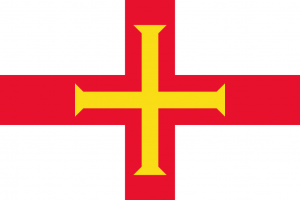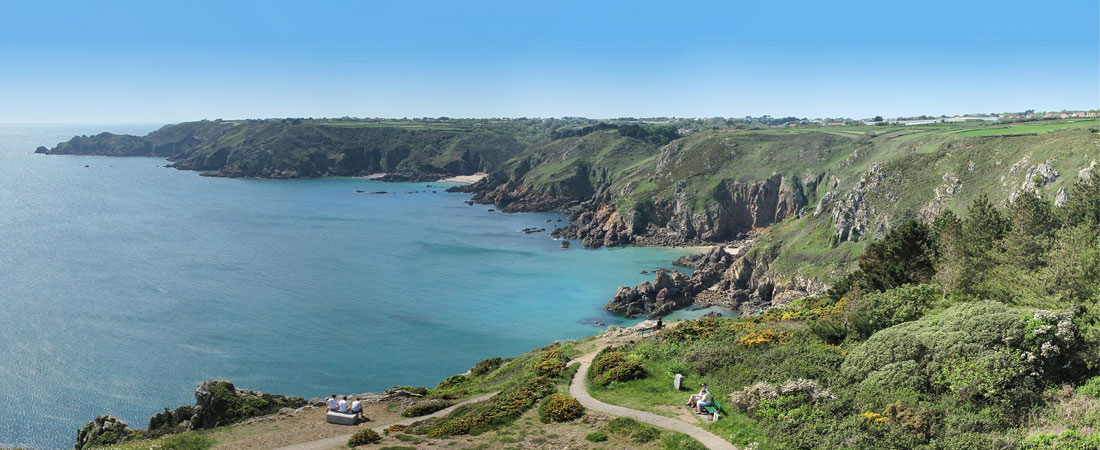Language/English/Culture/Guernsey-Timeline
Jump to navigation
Jump to search
Rate this lesson:
Historical Timeline for Guernsey - A chronology of key events
Middle Ages[edit | edit source]
- When the Bretons emigrated to Armorica in the sixth century, a few groups were able to settle on the Channel Islands, then called the Lenur Islands. Saint Samson is famous for having made a stopover on the island. He would have subsequently obtained the attachment of the archipelago to the church of Dol. The hermit establishment of Grandes Rocques is typical of the Breton world, but it seems just as connected to Normandy, as evidenced by the presence of Norman pottery. At that time, Guernsey was called Lesia.
- In the year 933, the king of the Franks Raoul gave "the land of the Bretons situated on the shore of the sea", namely Avranchin and Cotentin to the Duke of Normandy Guillaume Longue-Epée, on his behalf to conquer them. These territories had been ceded in 867 to King Solomon of Brittany. Guernsey probably entered the Norman fold at this time, but it was not until the beginning of the eleventh century that a charter attested to the island's attachment to the ducal domain of Normandy.
- In 1339, Robert VIII Bertrand de Bricquebec, seizes Guernsey on behalf of the Valois.
- The island of Guernsey and the other Channel Islands represent the last vestiges of the medieval Duchy of Normandy, divided since 1204 between England and France. That year, the King of France Philippe-Auguste conquered mainland Normandy, while the King of England, Jean sans Terre, retained the Channel Islands.
- Several forts were built to defend the island of Guernsey: Cornet castle, Fort Clonque, Valle castle and Rocquaine castle.
- Despite numerous French attempts, Guernsey and its neighbors will remain under the scepter of the King of England, reigning here under the title of "Duke of Normandy". The Channel Islands are direct possessions of the British Crown but are not part of the United Kingdom or the European Union.
17th century[edit | edit source]
- Civil war is raging in England between the parliamentarians who sit in the Long Parliament and the royalists loyal to King Charles I. Republican Oliver Cromwell decides to put the king on trial. The trial took place from January 20 to 27, 1649 before a special tribunal, chosen by the some sixty deputies still sitting in the Commons (Rump Parliament). The conviction of "Charles Stuart" is acquired in advance, for high treason. He was beheaded in Whitehall, near Westminster, on January 30, 1649, at the age of 49. A week later, the House of Lords was abolished and royalty abolished. Following these events, the English civil war resumed between parliamentarians and royalists loyal to Charles II, son of Charles I Stuart beheaded.
- At the start of the English Civil War, in 1642, the islands of Alderney and Guernsey supported the Parliamentarians against the king who was supported by the island of Jersey. Subsequently, the bailiwick of Guernsey changes pro or anti-royalist governance or competes by governing in parallel de facto (1646-1651).
- 1643 - 1649: Robert Russell (appointed by Parliament)
- 1644 - 1646: Nathaniel Darrell (appointed by the King)
- May 29, 1646 - May 1649: Baldwin Wake (appointed by the King)
- 1647 - 1651: James Harrison (appointed by Parliament)
- October 26, 1649 - December 17, 1651: Roger Burgess (appointed by the King)
- 1650: Henry Sharp (appointed by Parliament)
- 1654 - 1658: Charles Waterhouse (appointed by Parliament)
19th century[edit | edit source]
- In the nineteenth century, several French personalities passed through Guernsey.
- The writer Victor Hugo took refuge there and lived in his house in Hauteville House.
- The French painter, Auguste Renoir, stayed there in 1883, and painted several canvases on the landscapes and flowers of Guernsey.
20th century[edit | edit source]
- During World War II, the island's population was evacuated. The island of Alderney was transformed into a vast concentration camp by the Nazis during the occupation of the Channel Islands. After the Liberation, only half of the population returned to their island devastated by five years of occupation. Official and government documents had been destroyed and lost. The Parliament of the United Kingdom quickly engages in a discussion on the political and statutory future of the island of Alderney. The Privy Council decides that the Parliamentary Assembly of the States of Guernsey should take charge of the institutions of the States of Alderney. A parliamentary assembly is then constituted in Alderney and submitted to the authority of that of Guernsey.
- Since 1949, the States of Alderney have appointed two of its members to sit in the deliberations of the States of Guernsey. These islands are the only dependent territories of the British crown occupied by Germany during the Second World War and were the scene of Operation Ambassador.
Source[edit | edit source]
World Timelines[edit source]
Other Lessons[edit | edit source]
- British Virgin Islands Timeline
- Tonga Timeline
- Best personal development books
- St Kitts and Nevis Timeline
- Bahamas Timeline
- Puerto Rico Timeline
- Countries where English is the Official Language
- St Helena Timeline
- Bermuda Timeline
- Christmas Island Timeline
- South Georgia South Sandwich Islands Timeline
- Gibraltar Timeline
- Ascension Island Timeline
- Heard McDonald Islands
- Timeline of the United States


